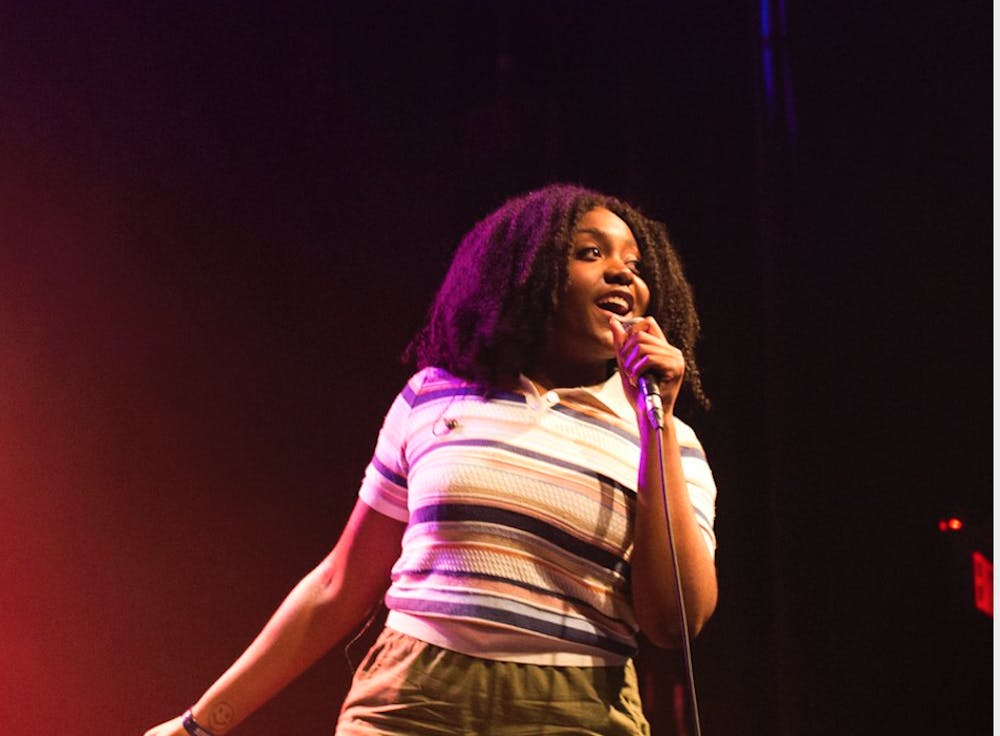The Foreign Affairs Symposium (FAS) hosted the rapper Fatimah Warner, best known as Noname, on March 18 to discuss her social activism and music. The event, the third of the symposium’s “Where Do We Go From Here?” speaker series, was hosted by FAS Co-Directors Ryan Ebrahimy and Margaret Hanson and moderated by Associate Professor of History Sasha Turner.
Warner has been featured on Chance the Rapper’s 2013 mixtape Acid Rap and has released two albums of her own, Telefone and Room 25. She has an upcoming album titled Factory Baby.
In 2019, she founded the Noname Book Club to highlight works by authors of color and support small bookstores and public libraries. Additionally, Warner created Library Card Registration Day in January 2020 to encourage people to register for library cards rather than support corporations like Amazon.
Warner described the significance behind her stage name and what it represents to her.
“It gives me space creatively to exist in different realms,” she said. “Noname is able to take on any persona and be anything and be completely unknown and obscure as well.”
Warner initially began her career as a poet and participated in open mics before turning to music. Her music focuses on her personal life and ideological principles.
She reflected on what inspires her to write.
“Rap is definitely poetry. My style is specifically poetic, which has its drawbacks because it is not as palatable to the average listener,” she said. “I was mirroring my experience. I need something to go off of and jolt me into a specific emotion or feeling.”
She expressed her belief that her music contrasts with mainstream music, highlighting that she still finds her music to be joyful despite some of its serious subject matters.
“I’m almost wrestling with my own world while being cradled in someone else’s soundscape. I feel joy talking about socialism and anti-imperialism,” she said. “A lot of the music out now feels a little hollow to me. It feels a little jovial, but it’s so commercialized.”
Warner identifies as a leftist who supports socialism and opposes imperialism and anti-Blackness.
She explained that her radicalization as a leftist developed from her racial identity and learning about the economic theories of capitalism and Marxism.
“The process of radicalization for me was really understanding that I was a colonial subject,” she said. “Being Black is to be like a non-being, and learning why that is and why the world is organized around anti-Blackness has been the most impactful part of my radicalization.”
Sophomore Cionne Gates found Warner’s activism inspiring, noting her own identity as a Black woman.
“The event was such a dynamic conversation of capitalism, Black activism and the multiple ways to become civically engaged with our respective communities,” she said. “Her insight as a rapper blended her creative expression with empowering idealism on being a Black woman [in] America.”
Warner shared her views on socialism and how she believes it could contribute to a better quality of life for the public.
“It means a reorganization of society and dismantling the current mode of production. It means folks being able to live in a way that is actually equitable and life-giving. For me, it means communalism,” she said. “It’s a way for us to live a decent life, all of us, where folks don’t have to be chronically exploited.”
Warner also commented in opposition to the proposed Hopkins police force based on the idea the police should be abolished.
“Fight against it as much as you can, and organize as a student body because you should not be policed in a place where you should be comfortably learning,” she said. “It’s always ‘fuck the cops.’”
Freshman DJ Quezada particularly enjoyed Warner’s criticism of the University’s planned police force.
“It was really exciting to hear her speak and give a shoutout to some of the causes we have been fighting for here at Hopkins, such as the campaign against Hopkins’ establishment of a police force in one of the most over-policed cities in the country,” he said.
Warner emphasized that students can be involved in movements to elicit change.
“The best way to uplift revolutionary movements is to be a part of them. Folks need to join organizations,” she said. “That’s what I’m doing, and that’s the most impactful way I can engage in activism or social justice work. If you want to uplift it, you need to be on the ground with folks in tandem with organizations.”
Margaret Hanson believes that Warner’s role as a young artist and activist allows her messages to resonate strongly with Hopkins students.
“Being exposed to a revolutionary and radical perspective on politics is important for young people to hear. We have a responsibility to think about what the future can hold and be as imaginative as possible,“ she said. “Noname invites a lot of those conversations through her advocacy efforts and social media presence.”
Chris H. Park, the programming director of FAS, is a News & Features Editor for The News-Letter. He did not contribute reporting, writing or editing to this article.





